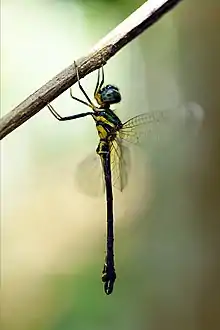| Saffron shadow dancer | |
|---|---|
 | |
| Scientific classification | |
| Kingdom: | |
| Phylum: | |
| Class: | |
| Order: | |
| Family: | |
| Genus: | |
| Species: | I. saffronatus |
| Binomial name | |
| Idionyx saffronatus Fraser, 1924 | |
| Synonyms | |
|
Idionyx saffronata Fraser, 1924 (Missp.) | |
Idionyx saffronatus,[2] or saffron shadow dancer, is a species of dragonfly in the family Synthemistidae. It is known only from the Western Ghats of India.[3][1][4]
Description and habitat
It is a small dragonfly with emerald-green eyes. Its thorax is brilliant metallic green with a narrow medial oblique stripe on each side. The posterior half of the metepimeron is yellow. Beneath the side is striped black and yellow. The abdomen is black. The first and second segments marked narrowly along the ventral borders with citron-yellow. Segments 7 to 10 are bordered with bright yellow. Segment 10 strongly keeled but without a dorsal spine. Anal appendages are black.[5]
Fraser (1936) states that the species occurs of altitudes of 3,000 ft and more. Nothing else is known about the habitat or ecology of this species.[5][6]
See also
References
- 1 2 Dow, R.A. (2009). "Idionyx saffronata". IUCN Red List of Threatened Species. 2009: e.T163732A5643070. doi:10.2305/IUCN.UK.2009-2.RLTS.T163732A5643070.en. Retrieved 20 November 2021.
- ↑ Paulson, D.; Schorr, M.; Abbott, J.; Bota-Sierra, C.; Deliry, C.; Dijkstra, K.-D.; Lozano, F. (2023). "World Odonata List". OdonataCentral, University of Alabama. Retrieved 14 Mar 2023.
- ↑ K.A., Subramanian; K.G., Emiliyamma; R., Babu; C., Radhakrishnan; S.S., Talmale (2018). Atlas of Odonata (Insecta) of the Western Ghats, India. Zoological Survey of India. pp. 272–273. ISBN 9788181714954.
- ↑ "Idionyx saffronata Fraser 1924 | Species".
- 1 2 C FC Lt. Fraser (1936). The Fauna of British India, including Ceylon and Burma, Odonata Vol. III. Red Lion Court, Fleet Street, London: Taylor and Francis. pp. 222-223.
- ↑ C FC Lt. Fraser (1924). A Survey of the Odonate (Dragonfly) Fauna of Western India and Descriptions of Thirty New Species (PDF). pp. 458–460.
